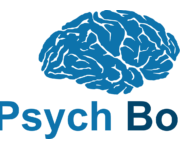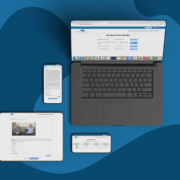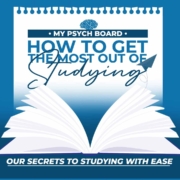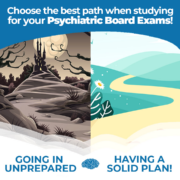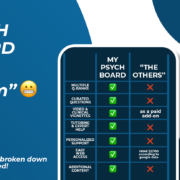Test Anxiety and How to Manage It!
Test Anxiety and Performance
Most people know that chronic or acute anxiety has negative impacts on performance. This is particularly true for academic performance in the form of test anxiety. But, what is more stressful than going in to take an exam that will determine the rest of your career? Obviously this goes without saying that exams and anxiety go hand in hand.
However, some people are impacted by this more than others. There are a few factors that influence this, and if you fall into one of these categories, we hope we can offer some help to get you through your next exam with flying colors!

Working memory can amplify the effects of test anxiety
Everyone feels the effects of anxiety. It makes it harder to concentrate, bring information to mind, and sucks your motivation. But there are some lucky individuals that feel these effects harder than others.
Working memory (WM) capacity, or the amount of information you’re able to hold in mind at a given time, differs across individuals. The more WM capacity you have, the more easily you can hold bits of information at the front of your mind and retrieve that information for a task at hand. The lower your WM capacity, the harder this is. This capacity varies from person to person.
People with low WM have increased effects of anxiety on test performance. The relationship seems to be: anxiety interrupts WM (which is already having a hard time), which in turn effects retrieval of additional information. Further, the anxiety the person is feeling diverts attention from the task at hand to worrying about their performance. This results in reduced performance which is not reflective of the person’s true ability!
Distress load
Another factor that can make test anxiety worse some compared to others is total distress their experiencing. Regardless of their working memory, if a person is experiencing high levels of distress, they will under perform on academic tests. High stress shuts down your prefrontal cortex which interrupts executive functioning and critical thinking. This leads to higher anxiety, reduced attention, and thus lower scores.
If you’re experiencing extraneous factors in your life that are causing you significant distress, this may have detrimental effects on your academic strivings.
So we know these different things hurt some people more than others, but what can we do about it?
Social Support
As we all know, people are social creatures. Studies have shown that increases in social support negatively predict test anxiety. So what does this mean? Stop studying for a hot minute and go chill with your friends! (What, a test prep site is telling me to NOT study??- yes!) The more we experience social support, the less likely we are to experience test anxiety. Does this mean it magically disappears? Unfortunately, no. But, it can help mitigate the amount you experience!
Self-Esteem
Self-concept, self-esteem, call it what you want. Individuals that have a greater capacity for self-esteem or self-care tend to have greater academic achievement, and this can reduce the effects of anxiety you experience. This isn’t a one size fits all concept. Some people come in knowing they’re the cat’s pajamas (and let’s be real, you really are 😉 ), but others need some help seeing the value they bring to the table just by being themselves.
Not to be repetitive, but if you fall into the second category, try getting around some people that help boost you up! If this isn’t a friend or other trusted person, sometimes seeing a counselor can help shift our perspectives on ourselves just a bit. And clearly the implications of doing this will reap reward!
Studying skills…what about those?
One last interesting thing about those of us that experience higher levels of test anxiety is we generally have GOOD study skills! So know that you have the tools to accomplish what you’re aiming for. You aren’t less intelligent even if your test scores come out lower than you know you can do. We know that, too.
At the end of the day, text anxiety can’t be totally dispersed as much as we’d like it to be. But, if you know you’re someone prone to experiencing it, we hope we dropped a few tidbits to help you get through your next round of exams with a little less stress! Want some extra practice? Try our question banks – FREE- using our Free Trial! Or if you’re ready to take the plunge, check out our Question Banks and find the best option for you! Or, contact us with any questions you have so we can get you on the right path today!
REFERENCES: Hyseni Duraku, Z., & Hoxha, L. (2018). Self-esteem, study skills, self-concept, social support, psychological distress, and coping mechanism effects on test anxiety and academic performance. Health psychology open, 5(2), 2055102918799963.
Matthews, G., Wohleber, R. W., & Lin, J. (2020). Stress, skilled performance, and expertise: Overload and beyond.



